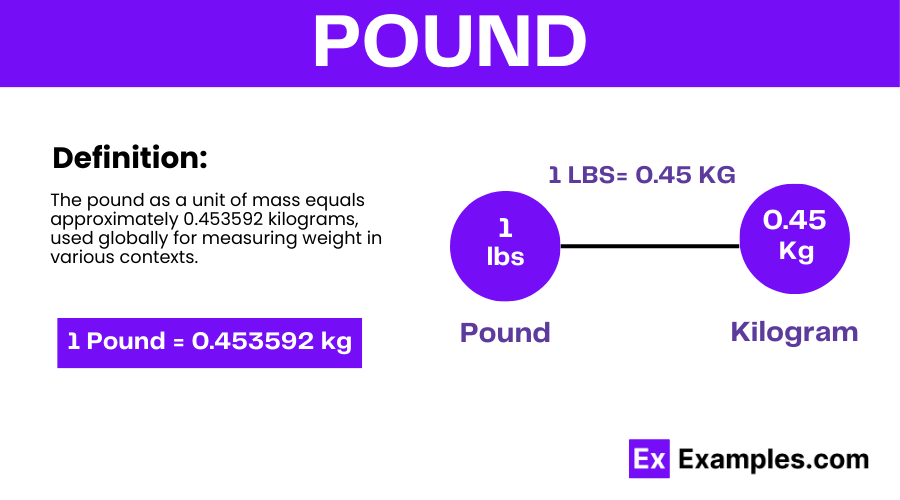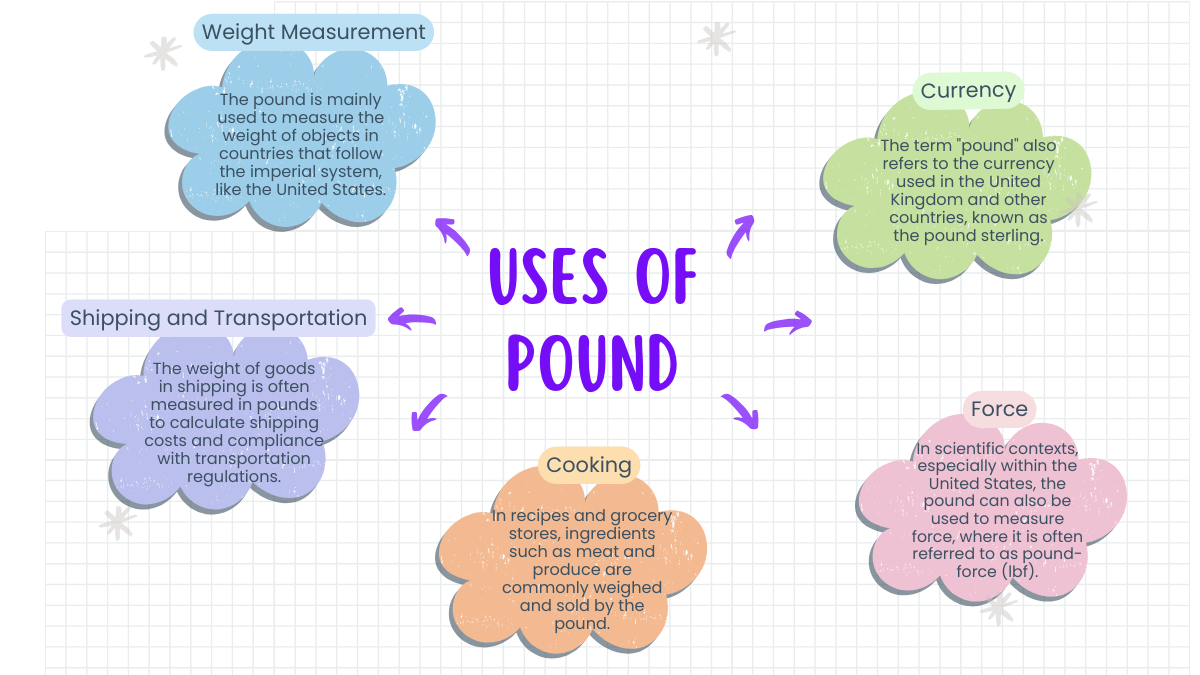What is the symbol for the pound in the Imperial system?
lb
kg
oz
g


The pound, as a unit of mass, is defined as exactly 0.453592 kilograms. Commonly used in the United States and other countries for measuring body weight, groceries, and other items, it is central to everyday and commercial transactions.
1 Pound = 0.453592 kg
Force (F):
Here, F is the force in pound-force (lbf), m is the mass in pound-mass (lbm), and a is the acceleration in feet per second squared (ft/s²).
Weight (W):
Weight is a specific type of force where the acceleration is due to gravity. Here, g is the acceleration due to gravity (approximately 32.174 ft/s² on Earth).
Conversion from mass to weight:
Given that pound-mass and pound-force are used interchangeably in everyday contexts but are technically different (with one being a unit of mass and the other a unit of force), it’s often necessary to convert between them using the acceleration due to gravity:
Energy (E) using the work-energy principle:
Energy or work done is the force multiplied by the distance over which the force is applied. Here, E is in foot-pounds (ft-lbf), F is the force in pound-force, and d is the distance in feet.
Power (P):
Power is the rate at which work is done. Here, P is in foot-pounds per second (ft-lbf/s), E is the energy in foot-pounds, and t is the time in seconds over which the work is done.

| Unit | Conversion Factor | Equivalent Value | Unit Description |
|---|---|---|---|
| Kilograms | 1 lb = 0.453592 kg | 1 lb → 0.453592 kg | Metric unit of mass |
| Grams | 1 lb = 453.592 g | 1 lb → 453.592 g | Smaller metric unit |
| Metric tons | 1 lb = 0.000453592 t | 1 lb → 0.000453592 t | Large metric unit |
| Ounces | 1 lb = 16 oz | 1 lb → 16 oz | Smaller unit in US |
| Stones | 1 lb = 0.0714286 st | 1 lb → 0.0714286 st | British unit of mass |
pounds and kilograms is defined as 1 pound being equal to approximately 0.453592 kilograms. This rate is used globally for mass conversion in scientific, commercial, and everyday contexts.
pounds and grams is established as 1 pound equating to 453.592 grams. This conversion is essential in various fields such as cooking, science, and commerce for accurate measurement and weight comparison.
pounds to metric tons is defined such that 1 pound is equivalent to 0.000453592 metric tons. This conversion is critical for large-scale weight calculations in industries like shipping, engineering, and commodities trading.
1 Pound (lb) = 16 Ounces (oz)
The relationship between pounds and ounces is standardized, with 1 pound equating to 16 ounces. This conversion is widely used in various fields including cooking, grocery shopping, and postal services for measuring weight in smaller, more practical units.
pounds to stone is defined such that 1 pound is equivalent to approximately 0.0714286 stone. This unit of measurement is commonly used in the UK and Ireland for body weight and other heavy items.

A pound is a unit of mass. However, in everyday usage, especially in the United States, it is commonly referred to as a measure of weight, assuming a standard gravitational force.
Pounds are calculated based on their definition relative to the kilogram, the base unit of mass in the metric system. One pound is officially defined as exactly 0.45359237 kilograms. This conversion factor is used in calculations to convert pounds to kilograms or other units of mass and weight, ensuring accuracy and consistency in measurements across different applications and systems.
In terms of mass, 100 pounds is equivalent to approximately 45.3592 kilograms. This is calculated by using the conversion factor where 1 pound is defined as 0.453592 kilograms.
Text prompt
Add Tone
10 Examples of Public speaking
20 Examples of Gas lighting
What is the symbol for the pound in the Imperial system?
lb
kg
oz
g
How many ounces are in one pound?
10 ounces
12 ounces
14 ounces
16 ounces
Convert 5 pounds to ounces.
50 ounc
60 ounc
70 ounc
80 ounc
Which of the following is closest to one pound in kilograms?
0.5 kg
0.7 kg
0.9 kg
1.1 kg
How many grams are there in one pound?
354 grams
454 grams
554 grams
654 grams
If an object weighs 10 pounds, how much does it weigh in kilograms?
2.27 kg
3.45 kg
4.54 kg
5.67 kg
What is the weight of 2 pounds in grams?
200 grams
408 grams
500 grams
908 grams
How many pounds are in 32 ounces?
1 pound
2 pound
3 pound
4 pound
Convert 3 pounds to kilograms.
0.93 kg
1.36 kg
1.81 kg
2.27 kg
If a newborn baby weighs 8 pounds, what is the weight in grams?
3520 grams
3632 grams
3720 grams
3814 grams
Before you leave, take our quick quiz to enhance your learning!

